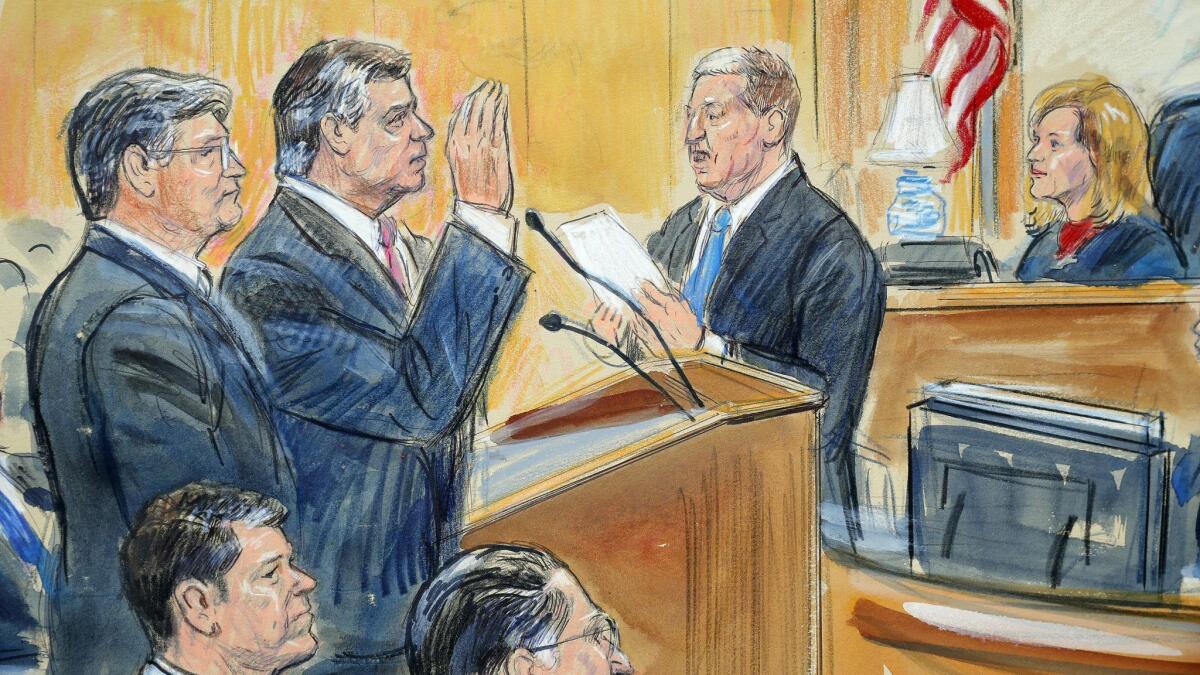Five takeaways from Paul Manafort’s plea agreement

Paul Manafort’s agreement to plead guilty and cooperate with the special counsel marks a milestone in the investigation led by Robert S. Mueller III. Here are several key elements:
Mueller knows more than we do
The public doesn’t know what Manafort has agreed to tell the special counsel’s investigators. The White House may not know, either. But Mueller and his prosecutors have a pretty clear idea.
Before accepting a plea agreement, prosecutors typically receive what’s known as a proffer — a statement by defense lawyers summarizing what their client can deliver. Prosecutors in Manafort’s case have not given specifics about what he’s agreed to tell them, but they did confirm that his lawyers gave the special counsel a proffer.
President Trump’s lawyers may have some indication of what Manafort could say. For months, they had a joint defense agreement with Manafort — a common tactic in white-collar criminal cases that allows defense teams to share information.
It would be unusual, however, for Manafort’s lawyers to have told Trump’s lawyers everything they were sharing with prosecutors.
Manafort is in position to know a lot
Trump likes to say that Manafort worked for him for only a short period. That’s true, but the period in which he served as campaign chairman, from mid-May through mid-August 2016, were key weeks for any investigation into whether Trump campaign figures colluded with Russian efforts to sway the presidential election.
Manafort was present for the meeting at Trump Tower in June 2016 that Donald Trump Jr. held with a Russian lawyer who, he was told, would provide “dirt” on Hillary Clinton.
His time at the campaign also overlapped with the first release by WikiLeaks of emails and other information taken from Democratic National Committee computers. Mueller has charged Russian intelligence agents with stealing that information.
Manafort’s cooperation with Mueller limits the chance of a pardon
Trump has suggested that he would consider pardoning Manafort, and he still could. But those hints all came before Manafort agreed to cooperate.
After Manafort was convicted last month in federal court in Alexandria, Va., the president praised him for refusing to cooperate with Mueller. Prosecutors “applied tremendous pressure on him and, unlike Michael Cohen, he refused to ‘break’ — make up stories in order to get a ‘deal.’ Such respect for a brave man!” Trump wrote.
That respect likely has now waned.
Moreover, Trump has little incentive to pardon Manafort once he’s already begun to cooperate.
Even before his sentencing, Manafort is losing a lot
Manafort could face roughly 10 years in prison, although his lawyers likely will argue for less.
But in addition to that eventual sentence, he has agreed as part of the plea deal to give up five properties in New York worth millions of dollars, including his apartment in Trump Tower, and several bank accounts. Prosecutors say all that property was tainted by his illegal activities.
Mueller is compiling a long list of victories
Although Trump frequently refers to the Mueller investigation as a “witch hunt,” the special counsel has now won convictions of or secured guilty pleas from six defendants, including Trump’s campaign chairman, his deputy campaign chair and his first national security advisor.
A seventh defendant, Trump’s former personal lawyer, Michael Cohen, pleaded guilty to charges brought by federal prosecutors in Manhattan who were acting on a case that Mueller referred to them.
Get the latest news from the nation’s capital on Essential Washington >> »
For more on Politics and Policy, follow me @DavidLauter
More to Read
Get the L.A. Times Politics newsletter
Deeply reported insights into legislation, politics and policy from Sacramento, Washington and beyond. In your inbox three times per week.
You may occasionally receive promotional content from the Los Angeles Times.






